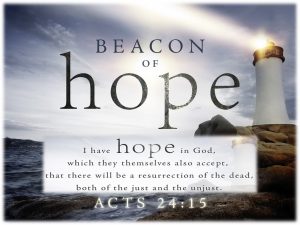ACTS 24: FALSELY ACCUSED!
It’s easy for people to claim that they are not Hindu or Buddhist, and yet in every other way believe in Karma i.e. future good or bad luck resulting from one’s present actions. A positive material gain from a spiritual “cause and effect”, where the intent and actions of an individual influences what good things they’ll gain in their future.
In recent years, I have come to fear that this idea has cross-pollinated into the framework of belief in the Creator God.  Clearly, Jesus has taught Good News about the good use of what we have in our hands, according to our ability. His stories show how our Maker will be proud of our efforts, and will reward us at harvest time for how we have used the life and the resources we have been given.[a] Paul, the 1st Century Jewish academic in today’s chapter, picked up on this when he taught about our life work being tested with fire in the end.[b] But after looking up the old saying: “…what you sow is what you reap…” it’s in the context of how the Creator God has always dealt with every nation, people group, or bad character in HIStory:
Clearly, Jesus has taught Good News about the good use of what we have in our hands, according to our ability. His stories show how our Maker will be proud of our efforts, and will reward us at harvest time for how we have used the life and the resources we have been given.[a] Paul, the 1st Century Jewish academic in today’s chapter, picked up on this when he taught about our life work being tested with fire in the end.[b] But after looking up the old saying: “…what you sow is what you reap…” it’s in the context of how the Creator God has always dealt with every nation, people group, or bad character in HIStory:
“Do not be deceived, God is not mocked; for whatever a person sows, this he will also reap.”[c]
So it seems to me that these words shouldn’t be translated as a promise of gaining something more or better in return for giving money or doing good deeds. Believers in the Creator God don’t get Karma. We get a right assessment (just judgement) pronounced over our lives when the court is seated and the books are opened.[d] But what has this to do with today’s chapter?
 With no solid promise of reward here on earth through a “spiritual cause and effect”, Paul couldn’t expect that events in his near future would be influenced positively by anything good that he did in the past or present. Quite the opposite, just as a seed falls to the ground and dies before a harvest can be reaped, what leaves our hand is likely to die before we’re likely to see anything come of it.[e] If true, Paul had to deal with whatever came his way each day, then leave the results to his Creator God. He had already been beaten up in Jerusalem, then whisked away at night for his own life’s sake.[f] In today’s chapter, He is being falsely accused once more. [v2-9] But if you want to look for truth, it’s often found in the peripheral stuff and in things not said.
With no solid promise of reward here on earth through a “spiritual cause and effect”, Paul couldn’t expect that events in his near future would be influenced positively by anything good that he did in the past or present. Quite the opposite, just as a seed falls to the ground and dies before a harvest can be reaped, what leaves our hand is likely to die before we’re likely to see anything come of it.[e] If true, Paul had to deal with whatever came his way each day, then leave the results to his Creator God. He had already been beaten up in Jerusalem, then whisked away at night for his own life’s sake.[f] In today’s chapter, He is being falsely accused once more. [v2-9] But if you want to look for truth, it’s often found in the peripheral stuff and in things not said.
For example, it’s a well-known fact the Jews hated the Romans who occupied their land. This is easily seen in the way they treated fellow Jews who had become tax collectors for the Romans.[g] Yet the opening statements of this Jerusalem lawyer who came into the storyline in today’s chapter, are clearly hypocritical to say the least!! The “peace” that Rome enforced was tenuous and the “reforms”, though begrudgingly accepted, were neither appreciated nor welcomed. [v3] It seems to me that Tertullus (a Lawyer that the Jews have found for their case) is positively “sucking up” to this Roman governor with false flattery. If so, it’s an early sign of whether his heart and tongue are capable of giving an honest speech based on the truth.
However, this 1st century Lawyer’s next statements (about “stirring up riots all over the world” and “desecrating the temple”) are in breach of Old Testament (Hebrew/Jewish) Law!  Giving a false testimony about your neighbour[h] along with the double-rule: “You shall not spread a false report; nor put not your hand with the rashah (join the morally wrong) to be an ed chamas (malicious witness)”[i], would have been well known to Paul’s accusers in today’s chapter. Anyone caught engaging in this sort of behaviour were in danger of receiving a scary penalty: “…Then shall you do to him, as he had thought to have done to his brother: so shall you put harah (multiplying/reproducing sin) away from among you…”[j]
Giving a false testimony about your neighbour[h] along with the double-rule: “You shall not spread a false report; nor put not your hand with the rashah (join the morally wrong) to be an ed chamas (malicious witness)”[i], would have been well known to Paul’s accusers in today’s chapter. Anyone caught engaging in this sort of behaviour were in danger of receiving a scary penalty: “…Then shall you do to him, as he had thought to have done to his brother: so shall you put harah (multiplying/reproducing sin) away from among you…”[j]
Rather than attempting to gain “goody points” with statements that weren’t true in his heart, Paul offers a polite acknowledgment for the Roman Governor’s position and authority before beginning. [v10] He then gave an account to the Governor to fill him in on what this case is about. But Paul doesn’t finish without pointing out to his accusers yet another violation of Jewish Law: that they needed two or three witnesses (this means eye-witnesses) for an accusation to be admitted as reliable evidence.[k] Certainly no-one could be put to death on the testimony of one witness[l] – a plan that the Jews hoped to carry out as soon as Paul was released.[m] So, Paul points out that the people who started the accusation (those from Asia who apparently witnessed what Paul was doing “all over the world”) weren’t present!!! [v19] The trial was a farce and their case invalid without first-hand witnesses, and this in violation of both Jewish and Roman law.
 With no solid ground for charging Paul, a Roman Citizen, in addition to discovering that this “trouble” that he was apparently causing stems from his message of righteousness, self-control, and judgement [v25], the Governor kept Paul confined for the next two years, calling on him regularly. [v26-27]
With no solid ground for charging Paul, a Roman Citizen, in addition to discovering that this “trouble” that he was apparently causing stems from his message of righteousness, self-control, and judgement [v25], the Governor kept Paul confined for the next two years, calling on him regularly. [v26-27]
Now, if I were a victim of false accusations that caused me to be wrongly confined for two years, I think I’d be angry, confused at God, despondent, bitter and any other emotion I could find on The Grief Wheel! But there’s no sense of this from Luke’s written account. Paul was held under guard in Herod’s Palace[n] – so at least he was safe. He had a roof over his head and his friends could attend to his needs [v23] – a privilege for Roman Citizens. But what seems to anchor Paul in his storm-filled journey, is something that dates back to his first encounter with Yehoshua ben Dovid (Jesus son of David). It’s something that was confirmed in his third divine vision[o] and that he would put into words to believers in the Roman port city of Corinth…
“The omein (the truth of it) I believe that Hashem (The LORD) has exhibited us, the Shlichim of Rebbe, Melech HaMoshiach, (the Apostles of King Messiah – Jesus) as last in the program, condemned to death, because, like wretches under a mishpat mavet (death sentence), we became displayed in the arena for the eyes of the Olam Hazeh (this whole world), malachim (the angels) as well as Bnei Adam (humankind).” [1 Corinthians 4:9]
 Although Paul used his knowledge of the Hebrew law and his rights as a Roman citizen to help himself, he also knew about his Maker’s “bigger picture”. While assuming responsibility for himself as best he could, Paul – like all the great “men of God” in the past – prayed, then acted. But under each circumstance, he relied on the sovereignty of the Creator God to bring HIStory to a good end.
Although Paul used his knowledge of the Hebrew law and his rights as a Roman citizen to help himself, he also knew about his Maker’s “bigger picture”. While assuming responsibility for himself as best he could, Paul – like all the great “men of God” in the past – prayed, then acted. But under each circumstance, he relied on the sovereignty of the Creator God to bring HIStory to a good end.
Undergirding it all is a peace, a trust, and a confidence that the Creator of everything we see, is in control. Regardless of where he was at the time, Paul regards every location as “the world” into which he had been called to serve his Marker, and to spread God’s Good News.[p] In an act of false accusation that cost him two years of his life, today’s chapter ends with Paul kept in prison. Bizarrely enough, this was for a Good News message of forgiveness and eternal LIFE for all!
CLICK to return to today’s “Daily Breadcrumbs”
[a] Matthew 25:14-30
[b] 1 Corinthians 3:12-15
[c] Galatians 6:7 (Context: v7-10)
[d] Daniel 7:10
[e] John 12:24
[f] Acts c21-23
[g] Matthew 9:11; Luke 7:34 (Luke c15)
[h] Exodus 20:16
[i] Exodus 23:1
[j] Deuteronomy 19:19
[k] Deuteronomy 19:15
[l] Deuteronomy 17:6
[m] Acts 23:12-15
[n] Acts 23:35
[o] Acts 23:11
[p] Mark 16:15